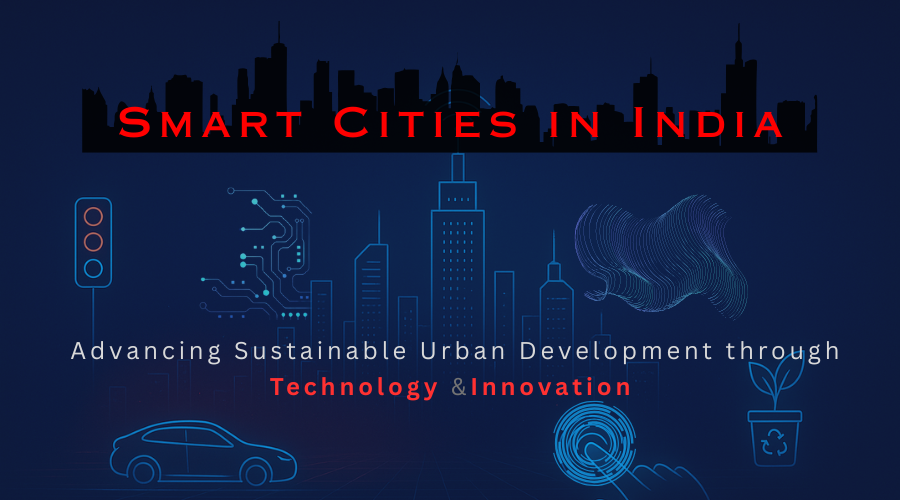India’s Smart Cities are turning sustainability dreams into reality with tech-driven urban innovation
Urban India is entering a new phase of change adopting Smart Cities Mission, sustainable urban development, and technology-driven urban planning to shape the future. Since its launch in 2015, the Smart Cities Mission has accelerated digital infrastructure, e-governance, smart mobility, clean energy, and urban innovation-all vital pillars of modern cities striving for liveability and environmental sustainability.
This initiative, targeting 100 cities across India, deploys advanced ICT solutions, data analytics, and public-private partnerships to revamp core infrastructure- such as water supply, waste management, transportation, energy, and housing- into efficient, citizen-friendly systems. Aligned with Sustainable Development Goal 11, which emphasizes inclusive, resilient, and sustainable urbanisation, the mission underscores India's commitment to creating smart, sustainable cities.
By combining innovation and urban governance, India is positioning its cities as hubs of sustainable urban growth- where quality of life is elevated through green infrastructure, real-time solutions, and eco-conscious urban design. This synergy of technology and planning is driving a new era of smart, sustainable, and inclusive cities.
Mission Highlights & Progress
- Over 8,000 multi-sectoral projects valued at around ₹1.6 lakh crore were planned across the 100 cities.
- Nearly 90% of these projects (about 7,244), amounting to ₹1,45,312 crore, have been completed.
- As of early 2025, 7,479 out of 8,058 tendered projects were executed, utilizing ₹1,50,002 crore out of ₹1,64,368 crore tendered.
- Financially, the Centre released ₹46,787 crore of the ₹48,000 crore central assistance, with over 90% utilization.
Key Deployments:
- Integrated Command and Control Centres (ICCCs): Operational in all 100 cities, serving as real-time data hubs and COVID-19 “war rooms.”
- Public safety tech: Over 83,000 CCTV cameras, 1,884 emergency call boxes, and traffic enforcement systems (like ANPR and red-light detection).
- Sustainable infrastructure:
1. 9,900 km of water supply systems under SCADA surveillance.
2. 52 lakh+ solar/LED streetlights.
3. 4,700+ km of smart roads and 580 km of cycle tracks.
4. 7,654 smart classrooms, 40 digital libraries, 172 e-health centres, and 49,300 affordable housing units.
- PPP Integration: Over 199 projects worth ₹9,200 crore have been developed via public-private partnerships.
DataSmart Cities: Building a Culture of Data
To strengthen data-driven governance, the DataSmart Cities Strategy was launched with three foundational pillars: People, Process, and Platform. The strategy promotes institutional frameworks, policy development, and tech platforms for open, interoperable data systems - including the India Urban Data Exchange (IUDX) and open data portals.
Key initiatives include:
- Data Maturity Assessment Framework (DMAF): Helps assess cities’ readiness for adopting data-led governance.
- Smart City Open Data Portal: Hosts thousands of data catalogs for transparency and co-creation.
However, capacity gaps exist:
- In a 2020 DMAF review, only 45 cities had approved City Data Policies, and just 32 cities allocated a data budget for FY 2020-21.
Real-World Examples & State-Level Insights
- Indore: A Model of Urban Cleanliness: Indore, MP, has been India’s cleanest city (2017-2023) via Swachh Survekshan. Excelling in smart waste segregation, it achieved “Water Plus” status in 2021 for full wastewater treatment. The city also participates in the International Clean Air Catalyst Programme, implementing innovative solutions to improve air quality, making it a benchmark for sustainable urban development.
- Surat, Gujarat: An early member of the mission, Surat implemented the highest number of projects, focusing on smart environment, mobility, and citizen services. Partnerships with Microsoft, IBM, and TCS have underpinned its transformation.
- Chennai, Tamil Nadu: With an investment of ₹3,444 crore, Chennai’s efforts span smart mobility (adaptive traffic control, GPS vehicle tracking, ANPR cameras), green infrastructure (Miyawaki forests, vertical gardens), and digital systems in public transport.
- Vijayawada’s Golden Mile (Andhra Pradesh): This 2.9 km smart street on MG Road pioneered smart kiosks, free Wi-Fi, intelligent lighting, and real-time traffic sensors, all controlled via a central City Digital Platform. The project cost ₹7.83 crore, with partners like Cisco contributing significantly.
- Muzaffarpur, Bihar: Allocated ₹982 crore, Muzaffarpur has completed key projects, including the ICCC, park redevelopment, and junction improvements. Ongoing works include sewerage and drainage upgrades. Some initiatives- like RO water points and a bus terminal are yet to begin.
Current Challenges by City
- Nagpur, Maharashtra: 39 of 47 projects are complete; CCTV network and ICCC are operational. Seven projects (mainly roadworks and brick kiln rehabilitation) remain pending. The transition of management to the Municipal Corporation by December 2025 raises concerns over maintenance capability amid resource constraints.
- Ludhiana, Punjab: Out of 82 projects (₹923.56 crore), 71 are complete. However, the high-priority 24/7 water supply project remains stalled, missing multiple deadlines, despite punitive actions. Fund utilization stands at 98.83%.
- Nashik, Maharashtra: Of 21 planned projects (₹1,122 crore), 19 are complete. Two major initiatives—a water treatment plant and Godavari de-silting—worth ₹200 crore are still pending, with a strict completion deadline of Dec 31, 2025.
- Warangal & Karimnagar, Telangana: These cities lag significantly despite full funding. Warangal completed only 66% of its 119 projects (₹1,800 crore), and Karimnagar achieved 75% on 49 projects (₹1,094 crore). Widespread delays are due to admin instability, frequent project changes, and integration issues.
- Uttar Pradesh (7 Cities): The state government has extended ₹100 crore each to seven cities to enhance infrastructure like roads, solar lighting, and health services. The mission has now been extended to March 2027 to facilitate these efforts.
Conclusion
India’s Smart Cities Mission has delivered transformative outcomes, with over 90% of projects completed, vast infrastructure upgrades, and digital innovations embedded in city management. The DataSmart Cities Strategy marks a pivotal shift toward data-led urban governance, though adoption and capacity-building remain critical levers. While success stories like Indore, Surat, Chennai, Vijayawada, and Muzaffarpur offer inspiration, remaining gaps—highlighted in cities such as Nagpur, Ludhiana, Nashik, and Warangal- underscore the need for focused closing strategies, resilience-building, collaborative governance, and long-term maintenance planning.
This journey offers a blueprint not just for India but for rapidly urbanizing nations worldwide, signaling a future where smart, sustainable, and digitally enabled cities elevate both governance and citizen well-being.
